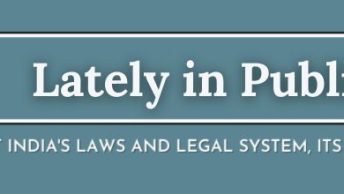A fortnightly feature inspired by I-CONnect’s weekly “What’s New in Public Law” feature that addresses the lacuna of a one-stop-shop public law newsletter in the Indian legal space.
What’s new at LAOT
Alok Prasanna Kumar, India’s Communal Constitution: Response by Alok Prasanna Kumar (as part of the book discussion on Prof. Mathew John’s latest book, India’s Communal Constitution: Law, Religion and the Making of a People, Alok Prasanna Kumar shares his critical views on the book)
Elsewhere Online
1. Rudraksh Lakra and Nidhi Jha, Kashmir’s Legal Exceptionalism Reinforced, Verfassungsblog.
2. Rhea L Vinay, Citizenship Rights and the ‘CAA’ Controversy: A Jurisprudential Analysis, NUALS Law Journal.
3. Megha Gohel Alkesh, Bars, Babies and Beyond: Right to Life of the Prisoner vs. the Child, The Society for Advancement of Criminal Justice.
4. Agrani Bhati and Aditya Singh, Anticipatory Bail for the Elderly: Exploring the judicial dilemma, The Society for Advancement of Criminal Justice.
5. Fawaz Shaheen, Sukriti and Samrridhi Kumar, Sighting Privacy Through High Courts: Introducing Key Highlights from the Privacy High Court Tracker, Centre for Communication Governance NLU Delhi.
6. Samrridhi Kumar, Sighting Privacy Through High Courts: Reiterating Procedural Safeguards and Privacy into Interception Orders, Centre for Communication Governance NLU Delhi.
7. Abhinav Somani, Inherent Inconsistency of the Death Penalty: A Temporal Analysis, The Criminal Law Blog NLUJ.
8. Ujjaini Biswas, Outlawing Marital Rape: A recurrently validated crime, Constitutional Law Society NLUO.
9. Snigdha Ghose and Mohak Chaudhary, Conserving Dialects: Bridging the Gap Amidst Law and Fact, Constitutional Law Society NLUO.
10. Rushil Batra, Shielding the “Public” from Religious Freedom? The Bombay High Court’s Judgment in the Hijab Ban Case, Indian Constitutional Law and Philosophy.
Lately in Academic Articles
1. Akshay Sriram, Privacy, Decisional Autonomy, and the Right to Intimate Association—Insights on the Cost of Being in Live-In Relationships in India Under New Legislation, Statute Law Review (examines the constitutional implications of mandatory live-in relationship registration under the Uniform Civil Code, focusing on privacy and decisional autonomy in light of recent jurisprudence).
2. Akshar Mehla & Lakshay Mehla, The Telecommunications Act, 2023: Solidarity Between Democracy and Totalitarianism, Statute Law Review (analyzes the Telecommunications Act, 2023, focusing on its implications for privacy and surveillance. It critiques the Act’s biometric identification systems in light of privacy rights as defined by Indian jurisprudence and examines how this legislative shift could signify a move towards totalitarian governance).
3. Hitishaa Goyal, The Age of Consent and Female Agency: Historical and Contemporary Perspectives, International Journal of Social Science Research and Review (examines how arguments for and against the age of consent reflect societal attitudes towards female agency and sexuality in India. The study explores historical and current debates, assessing the balance between protecting women from exploitation and respecting their sexual autonomy).
4. Imtiaz Quadri, The Changing Face of Indian Elections: Notes on the Lok Sabha Elections, 2024, Economic and Political Weekly (discusses the evolving nature of Indian elections in the context of the 2024 Lok Sabha elections, emphasizing the need for political and electoral reforms to uphold constitutional morality and ensure free and fair elections).
Listen Up
1. Why did the Puja Khedkar case cause a ruckus over the disability quota? By The Hindu ( delves into the controversy surrounding the disability quota in the Puja Khedkar case. It explores why this particular quota has come under fire, the legal rules governing such reservations, the certification process, and whether there are loopholes that need to be addressed)
2. The Supreme Court and reservations in India by The Times of India Podcast (Supreme Court lawyer Disha Wadekar breaks down the Supreme Court’s recent verdict on sub-quotas within reservations for Scheduled Castes and Scheduled Tribes. The discussion also covers the history of the Court’s judgments on reservations and the implications of its recent decisions)
3. A law to reduce reach? – The Times of India Podcast (features an in-depth analysis of the Supreme Court’s stance on reservations, focusing on how recent rulings might limit the reach of affirmative action. The episode explores the complex landscape of reservations in India and their socio-legal impact)
Opportunities and the Other things
1. 2nd NLUO-CLS Essay Writing Competition 2024. The last date for registration is 31 August 2024.
2. 2nd National PIL Drafting Competition by the Society for Constitutional Law Discussion. The last date to register is 5 September 2024.
3. 1st CLE-CNLU National Essay Writing Competition on Law and Economics, 2024. The last date for submission is 8 September 2024.
4. Call for submission by NUALS Constitutional Studies Review. The last date for submission is 15 September 2024.
5. 2nd SILP Essay Writing Competition by NUJS, Kolkata. The last date for submission is 15 September 2024
6. Call for Chapters: Libraries in the Modern Era by DNLU, Jabalpur. The last date for submission is 15 September 2024.
7. Call for Papers by MNLUA Student Law Review. The last date for submission is 15 October 2024.
This initiative was started by the Law and Other Things Student Team with the guidance of Surbhi Karwa and Anubhav Kumar.





hat8um
ovjsdz
gridar
Spor Habeleri,Güncel Haberler, Sondakika Haberleri
Atasehir bölgesinde ev arayisiniz var ise, sizlere atasehirsatilik.com sitesini kesinlikle öneririm. Satilik Daire, Dükkan, Arsa ve Ofis imkanlari ile Atasehir bölgesinde profesyonel emlak hizmeti saglamaktadir.